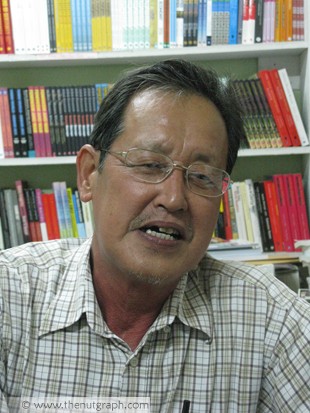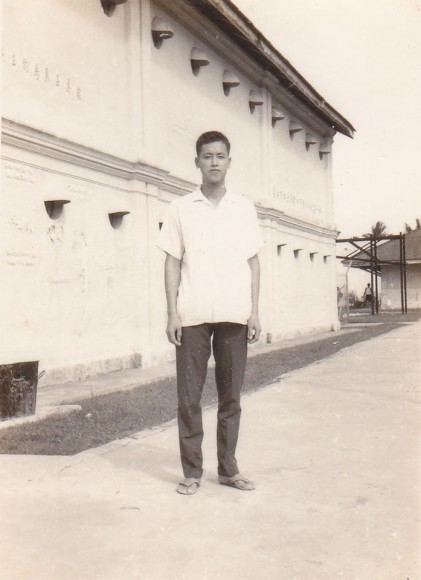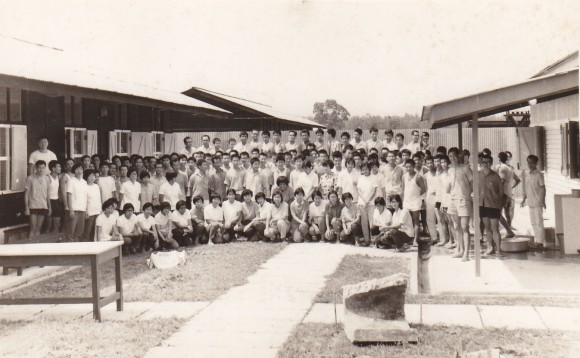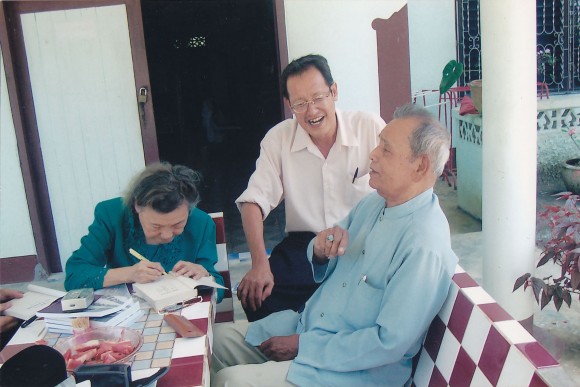
CHONG Ton Sin, 62, founded book distribution house GB Gerakbudaya Enterprises Sdn Bhd in 2000, in order to give Malaysians affordable scholarly and critical literature. The lanky book publisher is often seen at book fairs and public forums.
Known affectionately as Pak Chong, he is also executive director of Gerakbudaya’s sister company, the Strategic Information and Research Development Centre (SIRD), an independent publishing house. Chong says Gerakbudaya and SIRD are not ordinary distribution or publishing houses. They organise public dialogues, discussion forums, seminars and workshops, which “try to promote a new cultural movement that is scientific and progressive”.
“We want to encourage independent and critical thinking – our slogan is ‘people before profit’,” he says. “Of course you must pay for the books, but we try to keep our prices low so that as many people as possible are encouraged to read.”
Chong was also detained under the Internal Security Act (ISA) from 1968 to 1976. He is honest but not bitter about his detention: “That’s when I learnt English and Malay.” In a 1 June 2010 interview with The Nut Graph in Petaling Jaya, Chong talks about being born and growing up in a Malaysia that is a stone’s throw from Indonesia.
TNG: Where and when were you born?
Chong Ton Sin: I was born in Senai, Johor – in a house, I think – on 22 March 1948. One month after I was born, my family moved to Kluang, Johor.
Where did you grow up?
In Kluang, until I got arrested under the ISA in 1968. I went to a primary and secondary Chinese[-medium] school there. I didn’t finish secondary school.
Can you trace your ancestry?
I don’t remember my grandparents. My mother and father came from Guangdong province in south China. They got married there and then came to this part of the world. First they settled in Indonesia, in Riau island, I think. Yes, during [World War II], I think they were still in Riau. I have one elder sister who was born in China, two sisters and two brothers who were born in Indonesia, and myself and two younger brothers born here.
What is your strongest memory of Kluang?
We lived in a big Malay village. But there was a group of Chinese families living in the village. We lived harmoniously together, though the Chinese hardly interacted with the Malays. I couldn’t really speak Malay that well.
Even then, we were good neighbours. For example, some Chinese families would raise pigs which were free to roam in the village. If the pig wandered into a Malay family’s compound, they would just shout, “Oi, your babi has come into my house!” Then the Chinese family would reply, “Oh, we’re so sorry,” and then go get the pig. People were not so sensitive in those days. Now, I don’t know what would happen if a Chinese [Malaysian]’s pig wandered into a Malay [Malaysian]’s house.

There were many coconut trees in the village. I could climb them, but I wasn’t so good at it. There were better climbers among the village boys who used to go up and steal the young coconuts because the owner wasn’t there all the time. But one day the owner decided to grow the trees for toddy (coconut wine) instead, so his workers harvested the flowers – there were no more coconuts to steal. But we’d ask for toddy from the workers in the morning when it was fresh. The toddy from the afternoon harvest was sour.
What stories do you hold on to the most from your parents?
I don’t remember my parents telling me so much about China. They were simple lower-class workers. But they used to tell me stories about Indonesia – I think about Riau. For example, on the beaches in Riau, people would spot what they called “ghost fires”. It’s just a blue-green flame, but people thought it was a ghost on the beach.
My father would also tell me stories about the pontianak. He said it’s not a ghost but an animal, but kampung people called the animal “pontianak”. Whenever a woman gives birth, the animal will appear. I also forgot to ask my father if it’s a kind of monkey or what. But apparently whoever tries to kill the animal will die.
So, when my mother gave birth in Indonesia once, the animal came. My father said he used firewood to chase it away, but we also had a black dog that went to bite the animal. My father was okay, but the dog died.
How do you make sense of these stories as a Malaysian?
I want to find out what that animal is – is it a monkey or what? Other than that, I was nearly born in Indonesia, so I feel a kind of closeness to Indonesia. And so I started reading Indonesian novels and so on from early on, and they influenced me a bit.
What aspects of your identity do you struggle most with as a Malaysian?
People ask me why I speak Malay with an Indonesian accent. People ask, “Are you Malaysian?” I say, “Saya orang Nusantara.” You know, kepulauan Nusantara? My cultural identity is Nusantara. Race, I don’t know if I’m pure Chinese or not. I know we are Hakka, but I don’t know if I’m mixed or not. My cultural identity is clear, though. I have no feeling for China.
That’s why also younger people now call me “Pak Chong”. In Indonesia, though, “Pak” is associated with the Suharto era. “Bung”, which means brother or comrade, is associated with the Sukarno era. But I think even younger Indonesians now use “Pak” quite naturally. So I don’t mind younger people calling me “Pak Chong”.
Why were you detained under the ISA?
You know lah, at that time, the government was afraid of anyone who could be a leftist or a communist. They were also scared of activists in the labour movement, or politicians from the Labour Party and Parti Rakyat.

Were you a member of any political party, or a leader in any movement?
No, I wasn’t. But I did attend demonstrations and “illegal assemblies” before that, and I had been arrested before.
So what was detention like for you?
I know you young people won’t like to hear this, but it was actually quite good for me. Back then, political detainees were treated better than other prisoners. Because I came from a poor family, the food I ate while in detention was better than what I used to eat outside. I could study in detention, I could exercise.
I didn’t sit around waiting for my release – in fact I think my eight-year detention was too short. I used to read a lot, and I got to make many friends, even with some of the wardens. Yes, some of the wardens were horrible, but many were quite nice and grew attached to us, especially since we were detained for quite some time. We’d play ping-pong and basketball with them.
Were you tortured in detention?
Yes, I was tortured, but not so seriously. It was during the initial period of detention. But back then it was different. I was first put in the Muar detention centre, and then I spent two months in Kamunting in 1973, and then the remainder of my detention was in Batu Gajah. I liked Muar and Kamunting. The grounds were lapang, and Kamunting at that time was new. In fact, the Kamunting wardens temporarily lost control of the detainees and we ended up enjoying free movement around the different sections in the detention centre. But Kamunting became terrible soon after that. In Batu Gajah I wasn’t so happy – the space was too confined.
Describe the kind of Malaysia you would like for yourself and future generations.
I think now it’s very difficult to say. Young people like you will ask, “What is bangsa? What is nation?” But I think it’s important to build a bangsa Malaysia. Many Chinese [Malaysians] would get sensitive if you recited the slogan “satu bangsa, satu bahasa, satu negara” to them. They equate “bangsa” with “Malay”, and “bahasa” with “Malay” as well.

For me, “satu bangsa” is “bangsa Malaysia”. “Satu negara” is of course Malaysia. But under “bangsa Malaysia”, we can still acknowledge that there are Chinese, Ibans, Kadazans, and so on. Yes, they are different races, but their cultural identity is Malaysian. “Satu bahasa” doesn’t mean we forbid people from learning or speaking other languages, but it does mean that all of us must be able to use Malay. This is important.
I think it’s about not emphasising “I’m Chinese” or “I’m Malay”. We all have our traditions and beliefs, it’s true. But it is more important to find a scientific and progressive culture. I think the younger generation knows this. But there are politicians, especially from the Barisan Nasional and Umno, who use politik perkauman to influence young people still. Otherwise, our young people would be quite happy living together.
But I’m optimistic about our future. The train will travel forward. We won’t go backward. ![]()
Read other Found in Malaysia interviews
The Nut Graph needs your support
[related-posts]


Rhan says
“Many Chinese [Malaysians] would get sensitive if you recited the slogan “satu bangsa, satu bahasa, satu negara” to them. They equate “bangsa” with “Malay”, and “bahasa” with “Malay” as well.”
Are you sure it is the Chinese Malaysian that equate bangsa and bahasa with Malay?
“But under “bangsa Malaysia”, we can still acknowledge that there are Chinese, Ibans, Kadazans, and so on. Yes, they are different races, but their cultural identity is Malaysian.”
Seems like you know well how the Chinese Malaysians perceive the slogan, but you just want to be more political correct, right?
“Satu bahasa” doesn’t mean we forbid people from learning or speaking other languages, but it does mean that all of us must be able to use Malay. This is important.”
The “WE” here is interesting. Who are THEY then?
the reader says
Pontianak is an animal???
Bread says
A Place
Merah Silu says
Satu negara, satu bangsa, dan satu bahasa. That is 1Malaysia!!!! I laughed when I read […] “Pak Chong”[‘s] claim that he belongs to [the] “nusantara”. But maybe what he meant was somewhere near Guangdong, rather than [the] Malay Nusantara.
Ewan Agnello says
I think this Pak Chong has forgotten that his roots are in China rather than Indonesia. He claims that he is coming from this part of the world, but cannot speak Bahasa well. What a contradiction!! From the picture, I understand that his understanding about Malays is confined to his former colleagues in PKM, such as Rashid Mydin.
Then again, maybe he enjoys Indonesia and Malaysia, and perhaps we should not disturb his understanding about “nusantara”.
kamal says
Well put, Pak Chong. This is what we have lost — an organic sense of becoming Malaysian. Today we have more and more people pandering to the idea that we are naturally divided, and [we have] those whose limited experience can only allow them to ridicule what they cannot comprehend. Sometimes when we laugh at others, the joke really is on us.